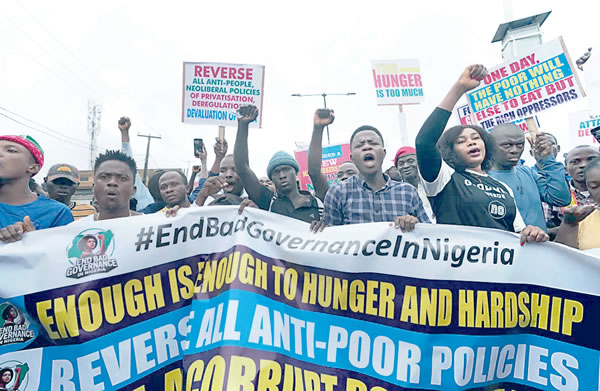Abuja Bureau Chief, LEON USIGBE, reports on President Bola Tinubu’s efforts to address the concerns of Nigerian youth embarking on a protest against the country’s harsh economic conditions.
THE #EndBadGovernance group, though somewhat obscure and lacking clear structure, appeared determined to rally Nigerian youth for a protest against the rising cost of living. The President Bola Tinubu administration, however, considered the protest unnecessary, citing ongoing efforts to alleviate the economic hardships largely attributed to the removal of the petroleum subsidy.
Opposition leaders interpreted the president’s stance as an attempt to suppress the right to protest, a right they view as essential for holding the government accountable. Atiku Abubakar, the Peoples Democratic Party (PDP) presidential candidate in the 2023 election, criticized the administration, stating, “It is deeply ironic that those who now seek to stifle these rights were themselves leading protests in 2012. A responsible government must ensure a safe and secure environment for citizens to exercise their constitutionally guaranteed rights to peaceful protest. Any attempt to suppress these rights is not only unconstitutional but a direct affront to our democracy.”
President Tinubu denied these accusations, affirming that while protests are a vital part of democracy, no government would tolerate demonstrations that result in the destruction of lives and property. He referenced his own history of peaceful protests during Nigeria’s military era, emphasizing, “We have worked hard to ensure 25 years of unbroken democracy and I will continue to maintain this democracy. In as much as we believe that demonstrations are part of democracy, we will never encourage any protests that lead to the destruction of lives and property.”
In a bid to prevent the planned protest, Tinubu began mobilizing opinion leaders across the country—including traditional and religious figures, politicians, civil society groups, and the media—to dissuade the youth from taking to the streets. He used every opportunity to highlight his administration’s efforts to mitigate the economic difficulties facing Nigerians.
Before the scheduled start of the nationwide 10-day protest on August 1, a list of demands from the protest organizers began circulating on social media and other platforms. The demands included reducing the petrol pump price to N100 per litre, addressing insecurity and hunger, closing all IDP camps and resettling the displaced, implementing total electoral reform, launching an independent probe into the N355 billion electoral budget, releasing EndSARS protesters still in detention, implementing a living wage of N300,000, providing compulsory free education from primary to secondary school, requiring public officials’ children to attend public schools in Nigeria, mandating the government to patronize made-in-Nigeria goods, transitioning to a unicameral legislature, and conducting a judicial and constitutional review.
The protest talk initially gained traction online, and with memories of the #EndSARS protests still fresh, President Tinubu acted swiftly to avert it. He urged the youth to abandon their “pointless” plans, remain calm, and allow the government time to address their grievances. The Minister of Information and National Orientation, Mohammed Idris, conveyed the president’s message, stating, “Mr. President has asked me to again inform Nigerians that he listens to them, especially the young people that are trying to protest. Mr. President listens to them, he takes what they say seriously, and he is working assiduously to ensure that this country is good not just for today but also for the future.”
The Tinubu administration argues that constructive engagement is preferable to street protests, referencing previous protests like the “Ali Must Go” demonstrations during the military regime, which ultimately did not result in the resignation of the Federal Commissioner of Education, Col. Ahmadu Ali. The government also views the more recent #EndSARS protests as having yielded largely negative outcomes.
While acknowledging the current economic challenges, which it attributes to the “unintended” consequences of bold policy decisions, the government is keen to point out that these measures are refining and recalibrating the economy for a better future. The Secretary to the Government of the Federation (SGF), George Akume, emphasized that the administration inherited an economy in urgent need of reforms, including the removal of the unsustainable fuel subsidy regime. While these measures have led to unexpected adjustments affecting all facets of the economy, the government remains focused on the long-term benefits.
To further prevent the protest, the government has taken additional steps, including releasing N5 billion to each state to cushion the impact of fuel subsidy removal, increasing the national minimum wage to N70,000, and distributing 20 trailer loads of assorted grains per state to alleviate food shortages. Tariffs have also been removed on imported food items to lower prices, and subsidized farm inputs, including fertilizers, are being provided to boost agricultural production. The administration has also established a Ministry for Livestock Development to address sector challenges, facilitate access to affordable protein, and enhance exports.
The government is also highlighting its infrastructure development efforts, including the construction of roads and other critical projects, as part of long-term measures to reposition the economy and ease transportation.
Additionally, the Supreme Court’s affirmation of local government autonomy, the establishment of a N35 billion Nigerian Education Loan Fund (NELFUND), and other initiatives are being touted as accomplishments that will help return Nigeria to the right track.
The Tinubu administration assures that these efforts will soon yield positive results, reducing economic hardships and leading to “endless prosperity” for all citizens. President Tinubu is hopeful that these initiatives will alleviate the frustrations of millions of Nigerians affected by the economic challenges stemming from his administration’s corrective policies.
READ ALSO: Police arrest 40 over looting, violence in Borno protest
